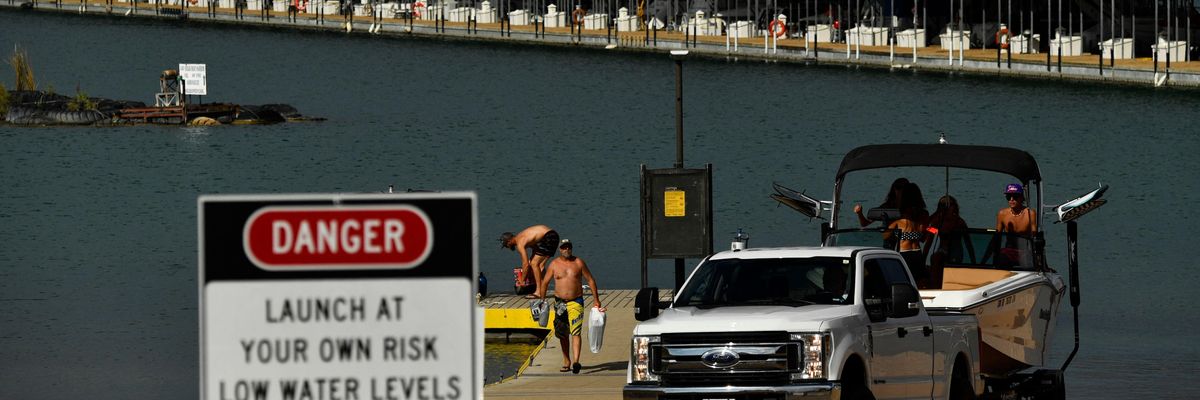As the climate emergency offers repeated signals it's an extreme new world, federal officials on Monday declared a record first "Tier 1" water shortage for Lake Mead, citing historic drought affecting the Colorado River basin.
The declaration from the U.S. Bureau of Reclamation was triggered by its projection that Lake Mead's elevation at the end of the year will be 1,065.85 feet, an estimate below the 1,075-foot threshold for the water shortage determination.
"The Colorado River is the lifeblood of our region, and we must start living within our means."
--Matt Rice, American Rivers
Currently, Lake Mead--the biggest U.S. reservoir by volume--is at about 1,067 feet and 35% of capacity, putting it at its lowest level "since the lake was filled after the Hoover Dam was completed in the 1930s," according toCNN.
"We are seeing the effects of climate change in the Colorado River Basin through extended drought, extreme temperatures, expansive wildfires, and in some places flooding and landslides, and now is the time to take action to respond to them," Tanya Trujillo, Interior Department assistant secretary for water and science, told reporters Monday.
Summarizing the confluence of factors affecting water levels, Axiosreported: "Hotter temperatures and a reduction to spring snowmelt has reduced the water flowing into the Colorado River from the Rockies, where the river begins, before winding its way into the Gulf of California. So too has burgeoning water demand from increasing populations and thirsty agricultural interests."
The Bureau of Reclamation also announced water reductions that will begin starting the new year. From CNN:
Arizona will see an 18% reduction in the state's total Colorado River supply, primarily impacting agriculture. Although Nevada will need to adhere to a 7% reduction in its Colorado River water supply in 2022, the state had already reduced its deliveries and no change is expected due to the shortage, according to John Entsminger, general manager of the Southern Nevada Water Authority.
Additional cuts--each tier with worsening impact on agriculture and municipal water--are expected if Lake Mead continues to fall. The second tier of cuts, triggered at 1,050 feet, could come as soon as 2023.
Mexico will also lose roughly 5% of its annual allotment, the bureau said.
"Climate change is an emergency. This is a fact," said Judith Whitmer, Nevada state Democratic Party chair, in a statement Monday.
The Intergovernmental Panel on Climate Change (IPCC) report released last week "was bleak," said Whitmer, "but it didn't tell us anything that we can't see with our own eyes right here in Nevada. Lake Mead is drying up. The Colorado River is drying up. The robust ecosystem of the Mojave is dying right in front of us, and the lives and livelihoods of millions of Nevadans are on the front lines of this crisis."
Addressing those threats, she added, entails measures far beyond just individuals' actions.
"Climate change is water change."
--Michael Cohen, Pacific Institute
"We can't equivocate any longer," Whitmer added. "While it is crucial that we all do our part to preserve water in our homes and businesses, that will never be enough: we need massive structural changes in the way we do things, and we need them quickly."
Matt Rice, Colorado River Basin director at American Rivers, made a similar call for sweeping action.
"While today's declaration is not a surprise, it is the loudest alarm bell yet," he said in a Monday statement. "We must start using less water, and we must find ways to do more with less water."
"The Colorado River is the lifeblood of our region, and we must start living within our means. The only way through this crisis," said Rice, "is with a strong plan and real leadership throughout the basin."
As Pacific Institute senior researcher Michael Cohen put it, "Climate change is water change," and the "Colorado River Basin manifests these changes in dramatic and sobering ways."
Discussing the historic declaration of the shortage for the Lower Colorado River Basin, Cohen explained that water demands in the West have been unsustainable for some time.
"In 1893, [U.S. geologist] John Wesley Powell observed that there was not enough water to supply western lands. We still haven't learned that lesson," said Cohen. "While many cities now use much less water than they did twenty and thirty years ago despite significant economic and population growth, others spin wild schemes to further deplete the dwindling Colorado River."
"Perhaps," he continued, "today's dire projections will compel water users to confront climate change and press their legislators to take meaningful action to reduce carbon emissions, and not just rearrange the deck chairs on a sinking ship."

